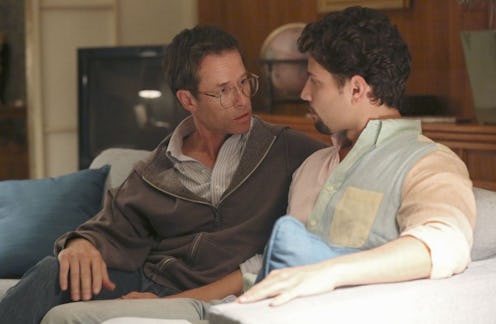
At its best, television can educate, reflect, and promote empathy while simultaneously entertaining. And if any upcoming series has the power to do all of those things, it's When We Rise, ABC's eight-hour docudrama about the fight for LGBT rights in America. When We Rise premieres Feb. 27 and airs three more nights that week. And all of those nights will definitely feature small triumphs and heartbreaking defeats. It's a dramatization of history rather than a documentary, so you may be wondering how accurate When We Rise will be to the real people and events it portrays.
The miniseries comes from the pen of Dustin Lance Black, who won an Academy Award for writing the screenplay of Milk, a biopic about California activist and openly gay politician Harvey Milk. According to The Daily Beast, Black spent four years researching and writing When We Rise. Some of that writing was done in the company of Cleve Jones, the long-serving LGBT rights activist (and former colleague of Milk) portrayed by Guy Pearce and Austin P. McKenzie at different ages in the miniseries. Jones and Black became good friends, and Jones lived in Black's spare bedroom during a portion of the creative process. At the same time, Jones was writing his own memoir, which the miniseries is loosely based on.
Historical accuracy can mean different things to different people. History is colored by experience and by privilege. Black went on to tell The Daily Beast that he looked to a diverse group of writers, directors, and actors to be sure that When We Rise wasn't prioritizing a white cis male experience over all others. Black said:
“They’re teaching me and correcting me when I get something wrong. So if you just check your ego and you bring in people who will help make it more representative in an authentic way, then you can avoid some of the criticism. But there will be criticism. And when I hear that criticism I applaud it, because it means someone was paying attention.”
In an interview with Paste, Black confirmed that he interviewed as many of the real individuals who figure into When We Rise as he possibly could and was committed to keeping each unique personality in tact. “I wanted to base [a character] on a real person, so if they are flamboyant in some way, terrific — that’s how I’m going to write them. If the lesbian is butch, great — that’s how I’m going to write them," Black said. Many of the actors also had opportunity to meet with their real-life counterparts.
But no matter how much information the creative team had in front of them, When We Rise still had to fit within a certain block of time and be watchable as a cohesive, easy-to-follow narrative. Cleve Jones told The New York Times that the small, factual changes Black and his team made to history don't dilute the overall realness of the miniseries. “It could be truthful without being accurate,” Jones said.
In the same article, Making Gay History podcast creator Eric Marcus pointed out that there's no way that a single miniseries, no matter how long, could possibly encompass the entire multi-faceted, nationwide push for equal rights for LGBT individuals and families. “What invariably happens is there will be people screaming that it doesn’t tell the whole story. Well, it can’t tell the whole story," he explained.
As most historical dramatizations do, When We Rise shapes real life to suit its medium. But this epic journey is still based in fact and on the lives of people who devoted themselves and are still devoting themselves to achieving equality for everyone.